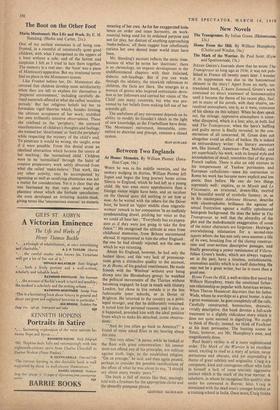The Boot on the Other Foot
ONE of my earliest memories is of being con- fronted, in a roomful of unnaturally quiet good children, with what I recognised as the uppers of a boot without a sole; and of the horror and suspicion I felt as 1 tried to lace them together. The memory is a real one : the 'boot' was a piece of Montessori apparatus. But my irrational terror had no place in the Montessori system.
Like Froebel before her, Dr. Montessori dis- covered that children develop most satisfactorily when they are left to explore for themselves a 'prepared environment,' including carefully de- vised materials offered at what she called 'sensitive periods.' But her religious beliefs led her to formulate rigid theories which, besides limiting the ultimate acceptance of her work, stultified her own brilliantly intuitive observations. These she confined to the 'periphery,' the outward manifestations of children's thoughts and feelings; she trained her 'directresses' to 'feed the periphery' while respecting the mystery of the child's soul. To penetrate it would be wrong, she taught, even if it were possible. From this denial arose an idealised abstraction which became the centre of her teaching: the 'normalised child.' Children were to be 'normalised' through the habit of creative preparatory work safely divorced from what she called `make-believe.' That work, like any other activity, may be accompanied by agonising as well as satisfying phantasies was not a matter for consideration. Yet it is clear that she was fascinated by that very inner world of phantasy about which she forbade speculation; she even developed an irritating double-think, giving terms like 'unconscious sources' an esoteric meaning of her own. As for her exaggerated insis- tence- on order and inner harmony, on work- material being used for its ordained purpose and not for play, her distrust of anything approaching `make-believe,' all these suggest how rebelliously curious her own denied inner world must have been.
Mr. Standing's account reflects the static time- lessness of what he terms her 'doctrines'; there is no chronology, no organic development in the undifferentiated chapters with their italicised, didactic sub-headings. But if you can wade through the idolatry, the mawkish references to children, the facts are there. She emerges as a woman of genius who inspired enthusiastic devo- tion in her followers and carried her vision of 'the Child' into many countries, but who was pre- vented by her beliefs from making full use of her scientific gift.
The usefulness of any movement depends on its ability to modify its founder's ideals in the light of new knowledge, as the Froebellians have done. The Montessori movement, immutable, com- mitted to doctrine and precept, remains a closed system.
JEAN HOWARD


































 Previous page
Previous page